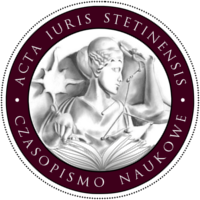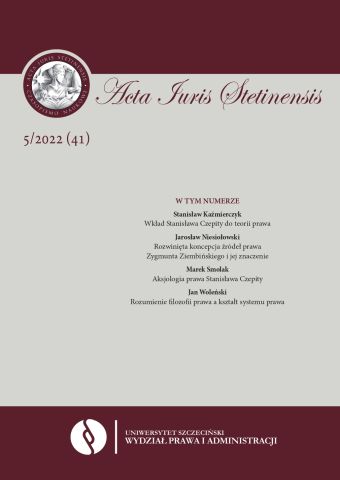







| Authors: |
Anna
Ceglarska

Uniwersytet Jagielloński |
| Keywords: | Dworkin hero mythologization coherence correspondence |
| Data publikacji całości: | 2022 |
| Page range: | 16 (21-36) |
| Downloads ?: | 92 |
| 1. | Arystoteles, Etyka Nikomachejska, tłum. D. Gromska, Warszawa 1982. |
| 2. | Arystoteles, Polityka, tłum. L. Piotrowicz, Warszawa 2010. |
| 3. | Barwicka-Tylek I., Prawda i sens, Kraków 2016. |
| 4. | Campbell J., Bohater o tysiącu twarzy, Poznań 2007. |
| 5. | Campbell J., Potęga mitu, Kraków 1994. |
| 6. | Ceglarska A., The Role of Myth in Political Thought, „Krakowskie Studia z Historii Państwa i Prawa” 2018, nr 11 (3). |
| 7. | Czarnowski S., Kult bohaterów i jego społeczne podłoże, w: idem, Dzieła, t. 4, oprac. N. Assorodobraj, S. Ossowski, Warszawa 1966. |
| 8. | Czech M., „Nec Hercules contra plures”. Czy Hercules jest autorem prawa, które stosuje?, w: J. Karczewski, M. Żuralska (red.), Refleksyjność w prawie, Warszawa 2015. |
| 9. | Dworkin R., Imperium Prawa, tłum. J. Winczorek, Warszawa 2006. |
| 10. | Dworkin R., Taking rights seriously, Cambridge, MA 1978. |
| 11. | Eliade M., Aspekty mitu, Warszawa 2006. |
| 12. | Finley M.I., Polityka w świecie starożytnym, Kraków 2000. |
| 13. | Fuller L.L., Moralność prawa, tłum. S. Amsterdamski, Warszawa 2004. |
| 14. | Hajduk-Nijakowska J., Proces mityzacji współczesnych bohaterów, w: P. Kowalski (red.), Mit, prawda, imaginacja, Wrocław 2011. |
| 15. | Homer, Iliada, tłum. K. Jeżewska, Warszawa 2005. |
| 16. | Kowalski K., Krzak Z., Tezeusz w labiryncie, Wrocław 1989. |
| 17. | Ksenofont, Pisma Sokratyczne, tłum. L. Joachimowicz, Warszawa 1967. |
| 18. | Lengauer W., Religijność starożytnych Greków, Warszawa 1994. |
| 19. | Lévi-Strauss C., The Structural Study of Myth, „The Journal of American Folklore” 1955, nr 68 (270). |
| 20. | Łętowska E., Pawłowski K., O prawie i o mitach, Warszawa 2013. |
| 21. | Matczak M., Imperium tekstu, Warszawa 2019. |
| 22. | Polibiusz, Dzieje, tłum. S. Hammer, Wrocław 1957. |
| 23. | Rank O., The Myth of the Birth of the Hero, Baltimore 2004. |
| 24. | Regan D.H., Glosses on Dworkin: Rights, Principles, and Policies, „Michigan Law Review” 1978, nr 76. |
| 25. | Samsonowicz H., O „historii prawdziwej”: mity, legendy i podania jako źródło historyczne, Warszawa 1997. |
| 26. | Solum L.B., The Unity of Interpretation, „Boston University Law Review” 2010, nr 90. |